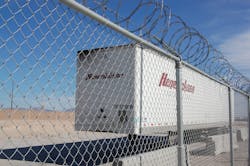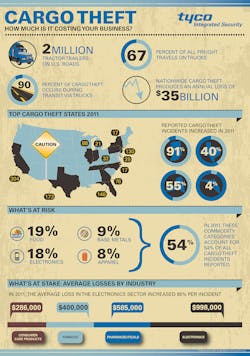Brand “damage” a side effect of cargo theft issue, expert says
One of the more problematic “side effects” of cargo theft for trucking companies and shippers alike is the issue of “brand damage,” especially when stolen goods are resold to consumers that may be made unsafe due to a variety of factors.
“If pharmaceuticals and foods are stolen but are not kept at the correct temperatures, then resold back into the market and make consumers sick, that can come back and damage the brands not only of the shippers but of the carriers as well,” Don Hsieh, director of commercial and industrial marketing for Tyco Integrated Security, told Fleet Owner.
There are also potentially significant monetary impacts to consider as well, he stressed.
“Take pharmaceuticals, for example, as most drugs are tracked by lot number,” Hsieh pointed out. “If a load is stolen and the manufacturer fears it may be resold into the market, it may be forced to recall the entire lot of that particular drug – and that may cost multiples of the value of that single stolen load.”
Foodstuffs pose a similar concern, too, especially as they are being targeted now more frequently by cargo thieves, According to consulting firm FreightWatch, in terms of the most stolen types of products, food and beverages topped the list in the third quarter this year with 49 thefts, or 21% of all thefts from July through September, with the electronics industry experiencing 29 thefts (13%), primarily of televisions and computer components.
Then there’s the impact of the Food Safety Modernization Safety Act passed in 2011 that puts more of a “preventive” onus of responsibility for food safety on the backs on shippers.
“The regulatory requirements of this act make food producers more responsible for the safety of their products, forcing them to take a more ‘preventive’ stance than the ‘reactive’ one they’ve had in the past,” Hsieh explained.
That also means the “reputational risk” for carriers serving those industries is higher as well, he pointed out.
“If a carrier is hit multiple times with cargo theft, that’s going to threaten their brand with shippers looking for not only reliable and dependable transportation but security as well,” Hsieh said. “Carriers need to ensure they have the right security processes and technologies in place to prevent theft so they can better position themselves to win the high value loads that offer the best rates.”
About the Author
Sean Kilcarr
Editor in Chief
Sean Kilcarr is a former longtime FleetOwner senior editor who wrote for the publication from 2000 to 2018. He served as editor-in-chief from 2017 to 2018.

